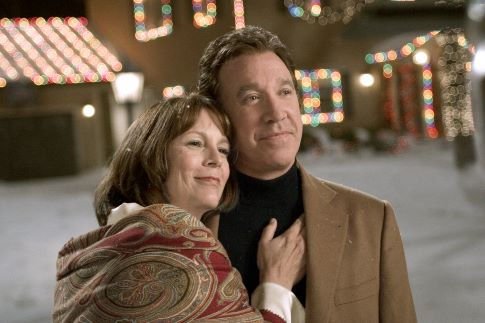an you skip Christmas? That’s precisely what Tim Allen and Jamie Lee Curtis attempt in 2004’s “Christmas with the Kranks,” a holiday comedy with two Scrooge’s instead of one. Allen has played a Scrooge-like character before, in 1994’s “The Santa Clause,” a movie that starts off with a disbeliever and has this character believing by the end. If holiday movies are hinged on predictability, you can probably guess how “Christmas with the Kranks” will end even before it begins. It’s not perfect, in any way, but is entertaining enough for those who never tire of holiday convention.
The basic premise of the movie is as follows: A couple living in Chicago find themselves alone for the first time when their daughter, Blair (Julie Gonzalo) joins the Peace Corps and heads off to Peru. Instead of spending gobs of money on Christmas, the couple decide to take a Carribean cruise instead and to, effectively, ‘skip’ Christmas.
What does this mean? Namely, no decorations, no presents, and a general lack of Christmas cheer.
The movie accomplishes this interestingly, in a string of events that includes not buying their usual Christmas tree from the local Boy Scout troop, refusing to donate to the Policeman’s Auxillary, and, in the film’s recurrent set piece, their stalwart refusal to adorn their roof with a gigantic Frosty the Snowman that hides in their basement.

Of course, this is a holiday movie, and “Kranks” can’t leave well enough alone, as we see the whole neighborhood take umbrage with the Kranks’ decision to sidestep the Holiday Season. This is handled in some ways that are funny (such as unwanted Carolers singing to the couple as they hide behind closed doors trying to enjoy a nice dinner), and some that are just annoying (as when all the neighborhood kids stand in front of the Kranks’ lawn chanting “Free Frosty” in tireless unison, as Achilles had called for Hector in the epic “Troy).”
Character-wise, “Kranks” isn’t that bad off, and features a fairly stacked cast including the likes of Dan Aykroyd, Cheech Marin, Jake Busey, and M. Emmet Walsh. Acting is not really a problem either, especially in Aykroyd, who plays the neighborhood’s self-appointed protector Vic Frohmeyer, who tries a number of tricks and gambits (and sometimes outright coercion) to convince the Kranks to drop their boycott on Christmas.
And, for their part both Allen and Lee Curtis have good chemistry together, and work as a couple. We see some non-Christmas activities the two engage in, such as lunch together and visiting a tanning booth at the local mall, but the movie never goes deep with their relationship. There’s an unspoken hurt of missing their daughter, and some other repressed emotions, that don’t really become apparent until the movie’s rather hackneyed conclusion. But as a whole we like them, which is probably what will cause even those not horridly engaged in the movie to follow it down its one hour and 39 minute run.
 Set wise, the film sells its image of Christmas to us – mostly with housing decor, snow-covered streets, and other holiday trappings – that show us just what the Kranks are missing out on this year. This is especially true as the movie winds to a close, and we see the Kranks fighting their urge to abstain from all things Christmas under town and family pressure.
Set wise, the film sells its image of Christmas to us – mostly with housing decor, snow-covered streets, and other holiday trappings – that show us just what the Kranks are missing out on this year. This is especially true as the movie winds to a close, and we see the Kranks fighting their urge to abstain from all things Christmas under town and family pressure.
The film is written by Christopher Columbus, based off a novel by John Grisham, and we can see Columbus trying to revisit his success from 1990’s “Home Alone,” even if he never quite gets there. “Kranks” is a composite of other movies, part “It’s a Wonderful Life,” part “A Christmas Carol,” and never really makes its stand as its own unique film. This may be a strength rather than a detriment. While “Home Alone” has a heart under its surface that makes it more than just a slapstick comedy, “Kranks” lacks this, and needs to lean on older classics to skate by.
By the end, viewers will mostly accept this about the film, if they managed to get through this long. We don’t find a miserable film, just a disappointing one that seems a mite unfocused, a touch sarcastic, that takes away from the emotional ending it was going for. It’s still there, slightly; but you have to wonder if a tighter story could have come from working hard for some real laughs or real emotions – both of which just come up short here.
– by Mark Ziobro


